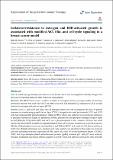Files in this item
Collateral-resistance to estrogen and HER-activated growth is associated with modified AKT, ERα and cell-cycle signaling in a breast cancer model
Item metadata
| dc.contributor.author | Moore, Kate M. | |
| dc.contributor.author | Cerqueira, Vera | |
| dc.contributor.author | MacLeod, Kenneth G. | |
| dc.contributor.author | Mullen, Peter | |
| dc.contributor.author | Hayward, Richard L. | |
| dc.contributor.author | Green, Simon | |
| dc.contributor.author | Harrison, David James | |
| dc.contributor.author | Cameron, David A. | |
| dc.contributor.author | Langdon, Simon P. | |
| dc.date.accessioned | 2022-03-10T11:30:15Z | |
| dc.date.available | 2022-03-10T11:30:15Z | |
| dc.date.issued | 2022-02-28 | |
| dc.identifier | 277588572 | |
| dc.identifier | 439724fa-c806-485e-b95d-c2c02cea0254 | |
| dc.identifier.citation | Moore , K M , Cerqueira , V , MacLeod , K G , Mullen , P , Hayward , R L , Green , S , Harrison , D J , Cameron , D A & Langdon , S P 2022 , ' Collateral-resistance to estrogen and HER-activated growth is associated with modified AKT, ERα and cell-cycle signaling in a breast cancer model ' , Exploration of Targeted Anti-tumor Therapy , vol. 3 , pp. 97-116 . https://doi.org/10.37349/etat.2022.00074 | en |
| dc.identifier.issn | 2692-3114 | |
| dc.identifier.other | ORCID: /0000-0001-9041-9988/work/109766648 | |
| dc.identifier.other | ORCID: /0000-0002-0841-609X/work/157141022 | |
| dc.identifier.uri | https://hdl.handle.net/10023/25022 | |
| dc.description | These studies were supported by grants from Cancer Research UK (C503/A5010 and C1938/A6769). | en |
| dc.description.abstract | Aim : A model of progressively endocrine-resistant breast cancer was investigated to identify changes that can occur in signaling pathways after endocrine manipulation. Methods : The MCF7 breast cancer model is sensitive to estrogens and anti-estrogens while variant lines previously derived from wild-type MCF7 are either relatively 17β-estradiol (E2)-insensitive (LCC1) or fully resistant to estrogen and anti-estrogens (LCC9). Results : In LCC1 and LCC9 cell lines, loss of estrogen sensitivity was accompanied by loss of growth response to transforming growth factor alpha (TGFα), heregulin-beta and pertuzumab. LCC1 and LCC9 cells had enhanced AKT phosphorylation relative to MCF7 which was reflected in downstream activation of phospho-mechanistic target of rapamycin (mTOR), phospho-S6, and phospho-estrogen receptor alpha Ser167 [ERα(Ser167)]. Both AKT2 and AKT3 were phosphorylated in the resistant cell lines, but siRNA knockdown suggested that all three AKT isoforms contributed to growth response. ERα(Ser118) phosphorylation was increased by E2 and TGFα in MCF7, by E2 only in LCC1, but by neither in LCC9 cells. Multiple alterations in E2-mediated cell cycle control were identified in the endocrine-resistant cell lines including increased expression of MYC, cyclin A1, cyclin D1, cyclin-dependent kinase 1 (CDK1), CDK2, and hyperphosphorylated retinoblastoma protein (ppRb), whereas p21 and p27 were reduced. Estrogen modulated expression of these regulators in MCF7 and LCC1 cells but not in LCC9 cells. Seliciclib inhibited CDK2 activation in MCF7 cells but not in resistant variants; in all lines, it reduced ppRb, increased p53 associated responses including p21, p53 up-regulated modulator of apoptosis (PUMA), and p53 apoptosis-inducing protein 1 (p53AIP1), inhibited growth, and produced G2/M block and apoptosis. Conclusions : Multiple changes occur with progression of endocrine resistance in this model with AKT activation contributing to E2 insensitivity and loss of ERα(Ser118) phosphorylation being associated with full resistance. Cell cycle regulation is modified in endocrine-resistant breast cancer cells, and seliciclib is effective in both endocrine-sensitive and resistant diseases. | |
| dc.format.extent | 20 | |
| dc.format.extent | 4444126 | |
| dc.language.iso | eng | |
| dc.relation.ispartof | Exploration of Targeted Anti-tumor Therapy | en |
| dc.subject | Breast cancer | en |
| dc.subject | Endocrine resistance | en |
| dc.subject | Estrogen | en |
| dc.subject | erbB receptor | en |
| dc.subject | Seliciclib | en |
| dc.subject | QH301 Biology | en |
| dc.subject | RC0254 Neoplasms. Tumors. Oncology (including Cancer) | en |
| dc.subject | RM Therapeutics. Pharmacology | en |
| dc.subject | NDAS | en |
| dc.subject | SDG 3 - Good Health and Well-being | en |
| dc.subject.lcc | QH301 | en |
| dc.subject.lcc | RC0254 | en |
| dc.subject.lcc | RM | en |
| dc.title | Collateral-resistance to estrogen and HER-activated growth is associated with modified AKT, ERα and cell-cycle signaling in a breast cancer model | en |
| dc.type | Journal article | en |
| dc.contributor.institution | University of St Andrews. Sir James Mackenzie Institute for Early Diagnosis | en |
| dc.contributor.institution | University of St Andrews. Cellular Medicine Division | en |
| dc.contributor.institution | University of St Andrews. School of Medicine | en |
| dc.identifier.doi | https://doi.org/10.37349/etat.2022.00074 | |
| dc.description.status | Peer reviewed | en |
| dc.date.embargoedUntil | 2022-02-28 | |
| dc.identifier.url | https://www.explorationpub.com/Journals/etat/Special_Issues/48 | en |
This item appears in the following Collection(s)
Items in the St Andrews Research Repository are protected by copyright, with all rights reserved, unless otherwise indicated.

